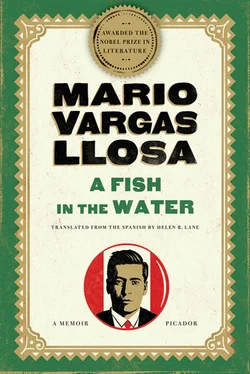Mario Vargas Llosa - A Fish in the Water - A Memoir
Здесь есть возможность читать онлайн «Mario Vargas Llosa - A Fish in the Water - A Memoir» весь текст электронной книги совершенно бесплатно (целиком полную версию без сокращений). В некоторых случаях можно слушать аудио, скачать через торрент в формате fb2 и присутствует краткое содержание. Год выпуска: 2015, Издательство: Macmillan, Жанр: Биографии и Мемуары, на английском языке. Описание произведения, (предисловие) а так же отзывы посетителей доступны на портале библиотеки ЛибКат.
- Название:A Fish in the Water: A Memoir
- Автор:
- Издательство:Macmillan
- Жанр:
- Год:2015
- ISBN:нет данных
- Рейтинг книги:3 / 5. Голосов: 1
-
Избранное:Добавить в избранное
- Отзывы:
-
Ваша оценка:
- 60
- 1
- 2
- 3
- 4
- 5
A Fish in the Water: A Memoir: краткое содержание, описание и аннотация
Предлагаем к чтению аннотацию, описание, краткое содержание или предисловие (зависит от того, что написал сам автор книги «A Fish in the Water: A Memoir»). Если вы не нашли необходимую информацию о книге — напишите в комментариях, мы постараемся отыскать её.
is a twofold book: a memoir of one of Latin America's most celebrated witers, beginning with his birth in 1936 in Arequipa, Peru; and the story of his organization of the reform movement which culminated in his bid for the Peruvian presidency in 1990.
A Fish in the Water: A Memoir — читать онлайн бесплатно полную книгу (весь текст) целиком
Ниже представлен текст книги, разбитый по страницам. Система сохранения места последней прочитанной страницы, позволяет с удобством читать онлайн бесплатно книгу «A Fish in the Water: A Memoir», без необходимости каждый раз заново искать на чём Вы остановились. Поставьте закладку, и сможете в любой момент перейти на страницу, на которой закончили чтение.
Интервал:
Закладка:
What had caused Sedano’s widow to change her mind and back my candidacy? The fact that she suddenly felt revolted by the way she had been used by the real dealers in corpses. That was what she told me, in front of Patricia and her children, weeping, her voice trembling with indignation. The night of the debate at the Civic Center had been the last straw, for, in addition to demanding that they be present, they had obliged her and the other widows and relatives of the eight journalists to dress all in black so that the press would find their appearance more striking. I didn’t ask her about the names or the faces of the “they” to whom she had referred, but I could well imagine who they were. I thanked her for her gesture and her support and took advantage of the occasion to tell her that, if I had reached the situation in which I now found myself, fighting to be elected to the presidency of Peru, something that had never before been an ambition of mine, it had been, in large part, because of the tremendous experience represented in my life by that tragedy of which Jorge Sedano (one of the two journalists killed in Uchuraccay whom I had known personally) had been a victim. While investigating it, so that the truth would come out, amid all the deception and lying that surrounded what had happened in those mountain fastnesses of Ayacucho, I had been able to see from close up — to hear and touch, literally — the depths of violence and injustice in Peru, the savagery amid which so many Peruvians lived their lives, and that had convinced me of the need to do something concrete and urgent so that our unfortunate country would change direction at last.
I passed the eve of election day at home, packing suitcases, since we had tickets to fly to France on Wednesday. I had promised Bernard Pivot to appear on his program “Apostrophes”—the next to the last in a series that had appeared on French TV for fifteen years — and was determined to keep that promise whether I won or lost the election. I was quite certain that the latter would be the case and that, therefore, this trip abroad would be a long one, so I spent several hours selecting the papers and file cards I needed in order to work in the future, a long way away from Peru. I felt completely exhausted, but at the same time happy that everything was nearly over. That afternoon, Freddy, Mark Malloch Brown, and Álvaro brought me the last-minute opinion surveys, from various agencies, and they all agreed that Fujimori and I were so evenly matched that either of the two of us could win. That evening Patricia, Lucho and Roxana, and Álvaro and his girlfriend and I went out to eat at a Miraflores restaurant, and the people at the other tables were uncommonly discreet all evening long, forbearing to engage in the usual demonstrations. It was as if they too had been overcome with fatigue and were anxious for the seemingly endless campaign to be over and done with.
On the morning of June 10, I went once again with my family to vote in Barranco, very early in the morning, and then I received a mission of foreign observers come to act as witnesses of the election procedures. We had decided that this time, instead of meeting the press at a hotel as I had done after the first round, I would go, as soon as the results were in, to the headquarters of Libertad. Shortly before noon, the results of the absentee balloting in European and Asian countries began to come in, on a computer set up in my study. I had won in all of them — even in Japan — with the one exception of France, where Fujimori had obtained a slight advantage. In my room, I was watching on television the last or the next to the last of the soccer matches for the world championship, when around one in the afternoon Mark and Freddy arrived with the first projections of the vote in Peru. The surveys had been wrong again, for Fujimori was ten points ahead of me throughout the country, with the exception of Loreto. This difference had increased when the first results were announced on television, at three that afternoon, and some days later the official computation count, by the National Election Board, would certify that he had won by 23 points (57 percent to my 34 percent).
At five in the afternoon I went to the headquarters of Libertad, at whose doors a great crowd of downhearted supporters had gathered together. I conceded that I had lost, congratulated the winner, and thanked the activists of Libertad. There were people who were openly shedding tears, and as we shook hands or embraced, a number of men and women friends of Libertad made a superhuman effort to hold back their tears. When I embraced Miguel Cruchaga, I saw that he was so moved he could barely speak. From there I went to the Hotel Crillón, accompanied by Álvaro, to greet my adversary. I was surprised at how small the demonstration by his partisans was, a thin crowd of rather apathetic people, who came to life only when they recognized me, some of them shouting, “Get out of here, gringo!” I wished Fujimori luck and went back home, where, for many hours, a parade of friends and leaders of all the political forces of the Front came by. Outside in the street, young people staging a spontaneous demonstration stayed until midnight, singing refrains in chorus. They came back the next afternoon and the one after that and stayed till far into the night, even after we had turned out all the lights in the house.
But only a very small group of friends of Libertad and of Solidarity found out the hour of our departure and came to the plane in which Patricia and I were embarking for Europe, on the morning of June 13, 1990. When the plane took off and the infallible clouds of Lima blotted the city from sight and we were surrounded only by blue sky, the thought crossed my mind that this departure resembled the one in 1958, which had so clearly marked the end of one stage of my life and the beginning of another, in which literature came to occupy the central place.
Colophon
A large part of this book was written in Berlin, where, thanks to the generosity of Dr. Wolf Lepenies, I spent a year as a fellow of the Wissenschaftskolleg. It was a salutary contrast with the preceding years to devote my entire time to reading, writing, conversing with my colleagues at the Kolleg, and struggling with the hieroglyphic syntax of German.
Early in the morning on April 6, 1992, I was awakened by a phone call from Lima. It was from Luis Bustamante Belaunde and Miguel Vega Alvear, who, at the second congress of Libertad, in August 1991, had taken my place as president and Miguel Cruchaga’s as secretary general. Alberto Fujimori had just announced on television, to everyone’s surprise, his decision to close Congress, the lower courts, the Tribunal for Constitutional Rights, and the National Judicial Council, to suspend the Constitution, and to govern by decrees. The armed forces immediately supported these measures.
In this way, the democratic system reestablished in Peru in 1980, after twelve years of military dictatorship, had its very foundations destroyed yet again, by someone whom, two years before, the Peruvian people had elected president and who, on July 28, 1990, on taking office, had sworn to respect the Constitution and the rule of law.
The twenty months of Fujimori’s administration were very different from what his improvisation and his conduct during the campaign had made Peruvians fearful of. Once elected, he soon divested himself of the economic advisers whom, between the first and second rounds of voting, he had recruited within the precincts of the moderate left, and sought new collaborators within the sectors of entrepreneurs and the right. The portfolio of minister of finance was entrusted to a turncoat from Popular Action — Juan Carlos Hurtado Miller — and advisers and collaborators of mine in the Democratic Front were placed in important public offices. The man who had made of the rejection of the economic shock treatment his warhorse in the electoral battle inaugurated his government with a monumental decontrol of prices, while at the same time reducing at one stroke import tariffs and public expenditures. This process would then be accelerated by Hurtado Miller’s successor, Carlos Boloña, who imposed on the country’s political economy a clearly anti-populist, pro-private enterprise, pro-foreign investment, and pro-market bias, and initiated a program of privatizations and a reduction in the state bureaucracy. All this with the approval of the International Monetary Fund and the World Bank, with whom the government began to negotiate the return of Peru to the international community, renegotiating the payment of its debts and their financing.
Читать дальшеИнтервал:
Закладка:
Похожие книги на «A Fish in the Water: A Memoir»
Представляем Вашему вниманию похожие книги на «A Fish in the Water: A Memoir» списком для выбора. Мы отобрали схожую по названию и смыслу литературу в надежде предоставить читателям больше вариантов отыскать новые, интересные, ещё непрочитанные произведения.
Обсуждение, отзывы о книге «A Fish in the Water: A Memoir» и просто собственные мнения читателей. Оставьте ваши комментарии, напишите, что Вы думаете о произведении, его смысле или главных героях. Укажите что конкретно понравилось, а что нет, и почему Вы так считаете.












